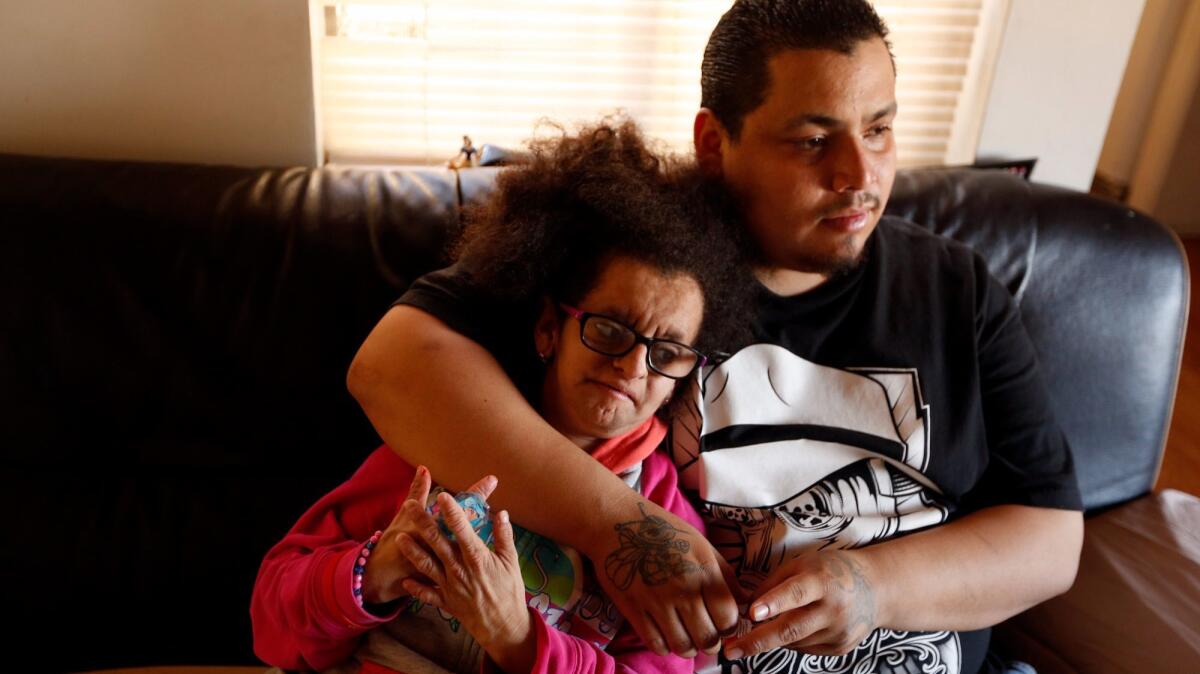Judge restores DACA status for L.A. immigrant busted while giving teen a ride to border area

A federal court in Los Angeles has ordered the United States government to restore the protected status of an immigrant in the country illegally who was arrested near the Mexican border earlier this year while giving a ride to a teenager who was later deported.
Jesus Arreola Robles, a beneficiary of President Obama’s Deferred Action for Childhood Arrivals program, was arrested by Border Patrol agents on Feb. 12 in Campo, Calif., about a mile from the border, and accused of trying to smuggle someone into the United States.
The 23-year-old North Hollywood resident said he thought he was giving a paid ride to a friend’s 17-year-old cousin.
He spent several weeks in detention before he was granted bail by an immigration judge who “found him credible” when he said he “hadn’t been involved in criminal activity,” said Katrina Eiland, an attorney for the ACLU’s Immigrants’ Rights Project who is representing Arreola Robles. He was never charged with a crime.
In March, Arreola Robles received a letter from U.S. Citizenship and Immigration Services saying that as a result of immigration authorities initiating removal proceedings against him because he was in the country illegally, his DACA status was being revoked.
U.S. District Judge Philip S. Gutierrez on Monday granted Arreola Robles a preliminary injunction and ordered the government to restore his DACA approval.
In his decision, Gutierrez wrote that because DACA was specifically created for people in the country illegally — and because noncitizens who have been or will be placed in removal proceedings are still eligible — terminating someone’s status based on that fact alone is “arbitrary and capricious” and violates the federal Administrative Procedure Act, which governs how executive-branch agencies make decisions.
“The public has a strong interest in ensuring that the nation’s immigration laws are robustly — and fairly — enforced,” Gutierrez wrote.
Arreola Robles is one of the plaintiffs in a class-action lawsuit filed by the American Civil Liberties Union on behalf of young immigrants challenging the Trump administration’s decisions to terminate their DACA grants and work authorizations “based on unproven allegations or low-level offenses, such as traffic violations” that do not disqualify them from the program, according to the ACLU.
Arreola Robles’ parents brought him to the United States illegally from Mexico when he was a year old. He had a work permit under President Obama’s DACA program since 2012.
After his DACA status was revoked, Arreola Robles lost the job he’d held at the upscale Chateau Marmont Restaurant for four years, said Eiland, his attorney.
He also couldn’t drive for Uber and Lyft because of the lost work permit and because federal authorities seized his car when he was arrested. It has not been returned, Eiland said.
“It was a tremendous hardship to lose DACA,” she said. “It’s been very difficult for him and his family since he was a primary source of financial support.”
Arreola Robles supported his parents and three younger siblings — one of whom has a rare genetic disease that causes her to age prematurely — and paid half their rent every month, Eiland said.
His problems began in February.
Arreola Robles said he was babysitting his three younger sisters when he got a call from a friend saying his cousin needed a ride from Sun Valley to the San Diego area and back. He said he was supposed to get $600 in cash for driving the cousin.
Arreola Robles said he had never met the cousin, a 17-year-old named Luis, before. He said the teenager told him he needed to pick up his uncle and cousin at a house near San Diego. Arreola Robles said the pair drove for more than three hours and that when they passed a parked Border Patrol truck, he thought, “All right, this is sketchy.”
Shortly afterward, he said Luis told him they had arrived and to pull over to the side of the road. In the dark, Arreola Robles said he could make out the shadow of a person. The teenager got out of the car and walked toward the figure.
It was a Border Patrol agent. Arreola Robles and the teen were arrested.
Arreola Robles is the only member of his family who was undocumented. His siblings were all born in the U.S., and his parents became legal permanent residents about three years ago, Eiland said.
When he learned about the judge’s order on Monday, he was greatly relieved. His first child, a boy, was also born Monday.
“He’s very excited,” Eiland said. “It was a big day for him yesterday. It’s wonderful news, especially with the Thanksgiving holiday coming up. It’s a lot to be thankful for.”
Twitter: @haileybranson
ALSO
Is it OK to mention a person’s immigration status in court? Washington state says no
California business leaders urge Congress to reauthorize DACA without a government shutdown
More to Read
Sign up for Essential California
The most important California stories and recommendations in your inbox every morning.
You may occasionally receive promotional content from the Los Angeles Times.










